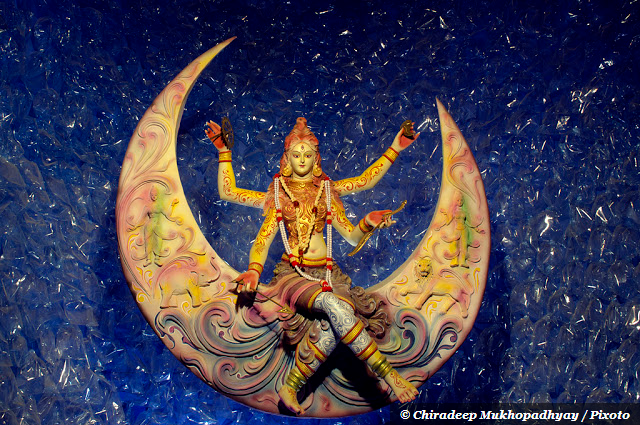
Once we are on the yogic path, there is no turning back.
It’s forever.
As most of us have experienced, all happenings have a divine and perfect timing. As our sleepy soul starts to wake up it may take some more time spent on the mat, and a few more “within” moments for our innate flame to ignite.
This is no surprise for those of us who have experienced uncontrollable degrees of emotions, memories or bodily sensations during our practice—often which are completely out of our control.
Tears, laughter, shakes, heat, cold; flashes of different sorts, varying from person to person. Sometimes we may simply feel an internal shift, a spark, ecstatic joy or a recognition of sorts that indicates to us that some dusty layers have been consciously peeled off and we can now see truth with slightly more clarity.
Seeing truth with our naked eye translates to a naked open heart. A heart ready to fulfill its duty of bridging the individual self to a higher self (such as the transformation of Atman to Paratman in Sanskrit). This is only possible through the practice of Bhatki Yoga, the yoga of devotion which, according to world renowned Ayurvedic doctor David Frawley, “is perhaps the most important and foundational of all yogas providing the foundation, feeling, passion or motivation that carries us along the path.”
According to Dr. David Frawley, “devotion in this way becomes a cultivation of qualities.”
Regardless of how we formulate God to be, the ancient Vedic-yogic way teaches us that in order to know truth ultimately we must be willing to see God in all beings, in all aspects of our lives and mind and most definitely in ourselves, or else our journey is not complete.
According to the Vedas, the heart cannot find ultimate happiness solely in human relationships, therefore yoga and Ayurveda recommend us to chose a form or approach to the divine that most appeals to our beloved hearts—similarly to having a guardian angel as our inner guide and form of inspiration. Having a chosen worship form does indeed provide us with a much higher sense of belonging, sense of security, a stronger connection to something bigger than ourselves—in much the same way that Buddhism, Hinduism, even Catholicism have a chosen devotional form so that devotees can have something their hungry hearts can bite into.
We all love the stunning and elaborate deity illustrations that the Hindu tradition has exposed to the world. As part of the Bhakti Yoga tradition, it is our duty to become familiar and further understand the various different forms of worship available to us so we can determinedly arrive at the deities feet. Chanting the mantra for each particular deity is also recommend as part of the integral path of Raja and Bhakti Yoga.
To give you a better perspective, I will share my own personal experience as to how I went about this process. I have chosen Ganesha as my main deity for worship. The reason why I was drawn to him was mainly because as a predominant vata dosha, I need grounding, as I tend to get stuck up on cloud nine due to the quality of air within me. I would like to invite more grace and softness to my personality and could most definitely use moving slower. Ganesha is well known for helping remove obstacles in times when we are starting a new endeavor or project.
The Bhagavad Gita states that, “we go to the realm of or gain the qualities of whatever we worship as supreme.
And according to Dr. David Frawley, “devotion in this way becomes a cultivation of qualities.”
Let’s have a look at the the most popular Hindu deities and their qualities of that could potentially bring us more balance overall. (Names may vary)
- Dhanvantari: Ayurveda’s chosen deity. Dhanvantari is a form of Vishnu, who rules over the forces of preservation in the universe, which include healing.
- Ganesha: The elephant-headed deity. Ganesha is the first son of Shiva and Parvati and carries the grace of the goddess. Ganesha rules over the forces of time and dispenses the fruits of Karma. As such he is more specifically a deity of Vedic astrology. He works to destroy all obstacles and this extends to healing. Ganesha is propitiated before any major endeavor. In addition, he grants wisdom and skill.
- Shiva/Rudra: Shiva is the deity of the universal life force. He calms and controls vata dosha and vayu (wind). Similarly, he controls the mind and helps counter emotional and psychological disturbances. Shiva is the cosmic transformative force. Rudra is the fierce form of Shiva relating to agni and fire. He is the deity ruling over fevers and grants recovery from them—this includes all manners of infection and contagious diseases. Rudra is also the deity governing over ayus (longevity), helping us overcome death-threatening diseases, accidents or circumstances.
- Krishna: Krishna is the form of Vishnu that holds all yogic powers, including all healing powers for our emotional nature.
- Lakshmi: Lakshmi is the wife of Lord Vishnu, the cosmic preserver. She grants health, wealth, beauty, fertility, happiness
&and abundance. Lakshmi is a special deity for women as she aids with women’s problems: gynecological disorders, fertility issues, menopause, etc. - Sarasvati: Sarasvati is the wife of Lord Brahma, the cosmic creator and the goddess of knowledge. She grants wisdom, intelligence, skills in the arts, good memory and anything related to study. She is worshipped for learning and education.
- Sundari: Sundari is the goddess of love, beauty, delight and soma (nectar of life).
- Hanuman: The monkey-faced god, son of Vayu, the wind god. He represents the higher force of prana behind vata dosha, as such he gives control over vata. He promotes rejuvenation, and also has the knowledge of and represents the power
ofof all the healing forces of nature. - Rama: Rama is another form of Vishnu as the ideal king and protector. Worshiping him protects us from all negativity.
- Kali: The goddess Kali is one of the main deities of the practice of yoga. She represents the reabsorption of the time-bound universe back into its eternal source. Kali governs over the process of merging. She is the power through which the elements merge back into each other (earth into water, water into fire, fire into air, air into ether, ether into mind, and mind into pure consciousness).
Choosing our own divine deity for daily worship is a process which in itself has some residual karma attached to it. For best results and meaning, meditate on it and let the deity come to you. It is a natural happening, similar to when a guru or a pet comes to us. As we live our truth and connect to our precious inner guides, life seems to dance to the joyous universal drum. We simply have to stop and learn to just let go, as we are here only as guests of the eternal human civilization growth.
Our guides are waiting.
Enjoy the process.
Namaste.
Love elephant and want to go steady?
Sign up for our (curated) daily and weekly newsletters!
Apprentice Editor: Ola Weber / Editor: Renée Picard
Photos: Flickr/Chiradeep Mukhopadhyay


 Share on bsky
Share on bsky




Read 1 comment and reply